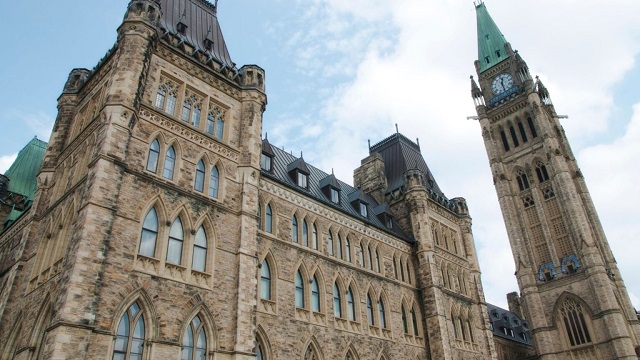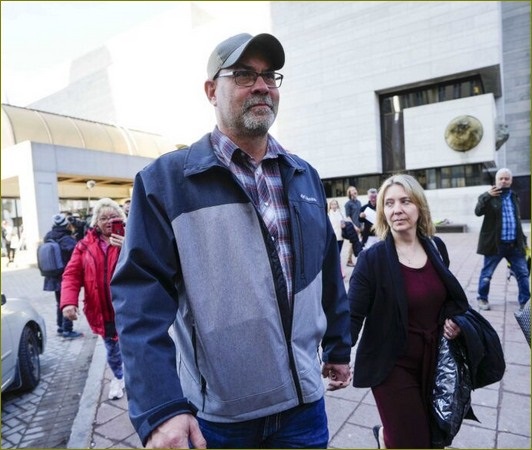Freedom Convoy
Ottawa spent “excessive” $2.2 million fighting Emergencies Act challenge

News release from the Canadian Constitution Foundation
Federal Court Justice Richard Mosley found in January that the February 2022 invocation of the Emergencies Act to deal with the Freedom Convoy protests was unreasonable because there was no national emergency nor threats to security of Canada as were required to invoke the Act.
The Canadian Constitution Foundation is shocked to learn that Ottawa spent more than $2 million of taxpayer funds unsuccessfully fighting the legal challenge launched by the CCF and others to the Trudeau government’s illegal invocation of the Emergencies Act in 2022.
The $2,231,000 figure was revealed by the Department of Justice in response to an inquiry from Conservative civil liberties critic Marilyn Gladu.
The hefty figure was first reported in the Globe and Mail. Experienced counsel told the Globe that the amount spent was “excessive.”
The number includes the cost that the government spent fighting the judicial review of the invocation decision in Federal Court. It does not include the cost of Ottawa’s appeal, which is proceeding at the Federal Court of Appeal.
Federal Court Justice Richard Mosley found in January that the February 2022 invocation of the Emergencies Act to deal with the Freedom Convoy protests was unreasonable because there was no national emergency nor threats to security of Canada as were required to invoke the Act.
Justice Mosley also found that regulations made as a result of the invocation violated freedom of expression because they captured people who “simply wanted to join in the protest by standing on Parliament Hill carrying a placard” and the right to be free from unreasonable searches and seizures because bank accounts were frozen without any sort of judicial pre-authorization.
CCF Litigation Director Joanna Baron was dismayed to learn how much Ottawa spent.
“Civil liberties groups like the CCF rely on regular Canadians who care about rights and freedoms to fund this type of public interest litigation,” she said.
“The fact that the government seems willing to spend whatever it takes to defend its unlawful decision shows what we’re up against when we fight to protect the constitution and the rule of law.”
The CCF is calling on the federal government to drop the appeal of Justice Mosley’s decision.
Canadians who agree with the decision are encouraged to sign the CCF’s online petition calling on the government to drop the appeal. The CCF is also asking Canadians to consider making a tax-deductible charitable donation to the CCF that will assist with fighting the appeal.
The CCF is represented by Sujit Choudhry of Haki Chambers and Janani Shanmuganathan of Goddard & Shanmuganathan.
Freedom Convoy
Freedom Convoy leader Chris Barber to learn in July whether or not he could face jail time

From LifeSiteNews
Chris Barber could receive a possible two-year sentence for his role in the 2022 protests after being found guilty of mischief.
Freedom Convoy leader Chris Barber will learn on July 21 whether or not he could face jail time when a ruling on a request for a stay of proceedings in his case will be announced by a judge.
Barber is facing potential jail time for his role in the 2022 protests that saw him being found guilty of mischief as well as the possible forfeiture of the truck he used in the convoy.
Freedom Convoy leader Tamara Lich announced on X that Barber’s request for a stay of proceedings was forthcoming.
“We attended court yesterday (virtually) to wrap up Chris’ Stay of Proceedings hearing. Her Honour will deliver her decision on this matter on the morning of July 21,” Lich wrote on X late last week.
“Following that we will begin the sentencing hearing which is scheduled for July 21, 23 and 25, likely kicking off with the Crown’s forfeiture order for Big Red.”
In April, Barber said that the Crown is seeking a two-year jail sentence against him and is also looking to seize the truck he used in the protest. As a result, his legal team asked for a stay of proceedings.
He and his legal team have argued that all proceedings should be stopped because he “sought advice from lawyers, police and a Superior Court Judge” regarding the legality of the 2022 protest. If his application is granted, Barber would avoid any jail time.
In April, both Lich and Barber were found guilty of mischief for their roles as leaders of the 2022 protest and as social media influencers despite the non-violent nature of the demonstration.
Lich is to be sentenced on July 23.
The Lich and Barber trial concluded in September 2024, more than a year after it began. It was only originally scheduled to last 16 days.
Lich and Barber were initially arrested on February 17, 2022, meaning their legal battle has lasted longer than three years.
Despite the peaceful nature of the Freedom Convoy, then-Prime Minister Justin Trudeau and his Liberal government invoked the Emergencies Act to clear-out protesters, an action a federal judge has since said was “not justified.” During the clear-out, an elderly lady was trampled by a police horse and many who donated to the cause had their bank accounts frozen.
The actions taken by the Trudeau government were publicly supported by Mark Carney at the time, who won re-election on April 28.
COVID-19
Freedom Convoy trucker Harold Jonker acquitted of all charges

From LifeSiteNews
The JCCF noted his truck was parked along Coventry Road, which is away from the downtown area of Ottawa, and that he faced no charges or fines while he was in the city for the protest.
One of the more prominent truckers involved in the 2022 Freedom Convoy protest movement has been acquitted of all charges.
On May 20, Justice Kevin B. Phillips of the Ontario Superior Court of Justice acquitted Harold Jonker of all charges. Jonker runs Jonker Trucking Inc. out of Caistor Centre in Ontario’s Niagara region, and rose to prominence for his role in the Freedom Convoy protest movement that sought to bring an end to all COVID-era mandates in Canada.
The Justice Centre for Constitutional Freedoms (JCCF), which helped Jonker in his case, noted in a press release that Justice Phillips concluded that “while the broader Freedom Convoy could be seen as a collective act of mischief, the Crown had failed to prove that Mr. Jonker was guilty of any of the charges beyond a reasonable doubt.”
“Harold and I are elated with the outcome of his case. We agree with the trial judge that the Crown had not proven its case beyond a reasonable doubt,” said Constitutional lawyer Chris Fleury.
Jonkers stated that he is “very thankful for the excellent legal support provided by the Justice Centre for Constitutional Freedoms, and thankful that the judge saw through the Crown’s weak case and had the courage to do the right thing.”
In February 2022, Jonker drove to Ottawa in his semi-truck alongside 12 other trucks from Jonker Trucking. A documentary called Freedom Occupation, which was distributed by independent outlet True North, featured him prominently.
In May of 2023, about 15 months after he participated in the Freedom Convoy, Jonker was told to turn himself over to the Ottawa Police Service to be processed for fingerprinting and to appear before a court on charges related to his association with the Freedom Convoy. He was charged with mischief, counselling mischief, intimidation, and counselling intimidation.
The JCCF noted his truck was parked along Coventry Road, which is away from the downtown area of Ottawa, and that he faced no charges or fines while he was in the city for the protest.
During the trial, held from May 12 to 14, saw the Crown argue before the Ontario Superior Court of Justice in Ottawa allege that Jonkers aided in organizing the Freedom Convoy.
Justice Phillips, as noted by the JCCF, addressed “two main themes advanced by the Crown,” the first being that the Crown had claimed that the media interviews Jonkers gave both during and after the protest amounted to counselling mischief.
“However, Justice Phillips found that Mr. Jonker was treated by interviewers like a ‘foreign correspondent’—someone describing events as he witnessed them. While supportive of the protest, Mr. Jonker’s words were expressions of opinion, not incitement to unlawful action,” noted the JCCF.
The second theme claimed by the Crown was that Jonkers was responsible for Jonker Trucking vehicles located in Ottawa’s downtown core.
“The Court found insufficient evidence to show that Mr. Jonker had control over those trucks,” noted the JCCF.
“Justice Phillips noted that, in Crown-submitted videos, Mr. Jonker explicitly stated that his own truck was parked in a yard, not downtown. Furthermore, the Crown offered no evidence regarding the corporate structure of Jonker Trucking Inc. that could prove Mr. Jonker had authority over vehicles belonging to the company.”
Trucker put his trust in ‘God’ after he was charged
In 2023, LifeSiteNews had reported on Jonkers, who noted at the time that the “truth will prevail,” and that he was “confident” in the face of his four criminal charges because he places his trust in “God.”
Jonker, who conducts about 90% of his trucking business in the United States, said the reason he participated in the Freedom Convoy was that he did not like the way COVID restrictions were impacting most Canadians.
The Freedom Convoy protest resulted in former Prime Minister Justin Trudeau enacting the Emergencies Act (EA) on February 14, 2022, to shut it down.
Trudeau had disparaged unvaccinated Canadians, saying those opposing his measures were of a “small, fringe minority” who hold “unacceptable views” and do not “represent the views of Canadians who have been there for each other.”
Trudeau revoked the EA on February 23 after the protesters had been cleared out.
Hundreds of protesters were arrested for participating in the Freedom Convoy while the EA was in place. Many had their charges dropped. However, some still have outstanding charges.
The use of the EA resulted in nearly $8 million in locked funds from 267 bank accounts. Additionally, 170 bitcoin wallets were frozen.
-

 Business10 hours ago
Business10 hours agoRFK Jr. says Hep B vaccine is linked to 1,135% higher autism rate
-

 Alberta2 days ago
Alberta2 days agoAlberta Independence Seekers Take First Step: Citizen Initiative Application Approved, Notice of Initiative Petition Issued
-

 Crime23 hours ago
Crime23 hours agoNational Health Care Fraud Takedown Results in 324 Defendants Charged in Connection with Over $14.6 Billion in Alleged Fraud
-

 Crime2 days ago
Crime2 days agoSuspected ambush leaves two firefighters dead in Idaho
-

 Alberta2 days ago
Alberta2 days agoWhy the West’s separatists could be just as big a threat as Quebec’s
-

 Health22 hours ago
Health22 hours agoRFK Jr. Unloads Disturbing Vaccine Secrets on Tucker—And Surprises Everyone on Trump
-

 Business2 days ago
Business2 days agoCanada Caves: Carney ditches digital services tax after criticism from Trump
-

 Business2 days ago
Business2 days agoMassive government child-care plan wreaking havoc across Ontario

